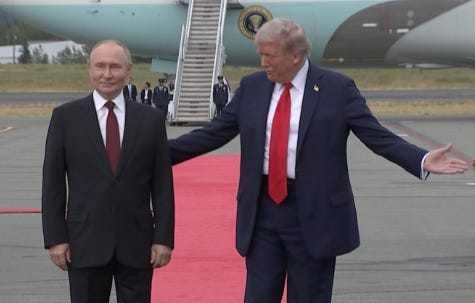Is Fear of Putin Justified? Absolutely.
Fears, Phobias, and the Actual Menace of Putin's Rule (Vol. 5; Issue 33)
When Russia invaded Ukraine in February 2022, it launched the first major ground war since World War II. In a historically inaccurate speech delivered days before the attack, Vladimir Putin proclaimed the Russian Federation’s right to expand into its late 19th century empire. Thousands of Ukrainian soldiers and civilians have since lost their lives. Russia’s European neighbors—such as Norway, Finland, Estonia, Latvia, Lithuania and Poland—watch the expanding war with alarm. Their fear of Putin is real. At the Russia-US summit just last week, Russian Foreign Minister Sergey Lavrov wore a sweatshirt emblazoned with CCCP, the Russian initials for the Soviet Union, further confirming Putin’s wish to recreate a Russian empire. Europe’s fear of Putin is justified.
We all know what fear feels like. It can range from the normative to the pathological. Most people are afraid of things like illness, crime, or death. These are, of course, normal. Pathological reactions include panic attacks, phobias, and post-traumatic stress disorder (PTSD). The terror felt by Ukrainians, and the angst of Europeans, resides entirely within the normal range of heartfelt reactions.
Unfortunately, last Friday’s summit in Alaska raised anxiety levels even higher. Trump played right into Putin’s hands. American troops unfolded a red carpet for him to ceremoniously walk upon. Trump invited Putin to ride in the presidential “beast.” He handed the Russian leader, newly invited in from the cold, an unparalleled public relations opportunity. Putin appeared pleased, smiling and confident, at the closing press conference in Alaska.
And, why wouldn’t he? Putin achieved all his objectives. Since the invasion, he has sought to disrupt Ukraine’s ties with NATO, to stymie Ukrainian nationalism, and to expand territorial gains. Putin made vague promises about security guarantees without altering these three objectives. Trump achieved nothing. He dropped the threats of intensifying sanctions on Russia he had promised before the summit. He endorsed Putin’s preference for a peace settlement prior to a ceasefire, which allows Putin to continue to shower Ukrainian cities with deadly bombs, missiles, and drones. By excluding Ukraine or other European countries from the summit, Trump bolstered Putin’s standing on the world stage.
Furthermore, the summit demonstrated Trump’s lack of any real understanding of the Russian leader. Putin is a ruthless dictator. His brutal, anti-democratic actions include imprisoning (or killing) political opponents, censoring independent media, preventing fair elections, and torturing prisoners. He conducts his foreign policy using military force.
Regarding Ukraine specifically, Putin’s war has cost more than a half million Russian lives and about half that many Ukrainian ones. Russia's own Children's Rights Commissioner, Maria Lvova-Belova, claims Russia had "accepted" nearly 100,000 Ukrainian children since the invasion began. These abductions, unspeakably traumatic to the children as well as the Ukrainian families affected, constitute a war crime by themselves.
Unlike Trump, Putin is highly intelligent and well-educated. He knows how complimenting and tempting Trump with potential business deals disarms him. Confirming his ignorance of or, at least, his naiveté, Trump showed little understanding of the threats posed by Russia’s expansionist behavior. He twice halted prearranged military shipments to Ukraine since taking office. He accused Ukraine of starting the war—a complete distortion of historical events. Trump also seems unaware of Putin’s long history of making and breaking promises.
In sum, Trump seems intent—willfully or not—on abandoning European allies and surrendering to Putin’s imperialism. As I finalized this essay, The New York Times reported that Trump interrupted the Monday White House meeting with European leaders (including Zelensky) to take a phone call from Putin. Criticizing Trump’s attitudes towards Ukraine, US Senators Jeanne Shaheen and Elizabeth Warren (2025) wrote in a joint statement:
Every month Trump’s spent in office without action has strengthened Putin’s hand, weakened ours and undermined Ukraine’s own efforts to bring an end to the war.
Or, as The Atlantic’s staff writer Anne Applebaum puts it,
The U.S. has no cards because we’ve been giving them away.
Trump’s exaltation of Putin brings peril to the world, eliciting reality-based fears across the globe. But some still think a military conflict far from American shores is irrelevant. Some refuse to believe that, if successful in subjugating Ukraine, Putin would soon move to invade other European countries. Such levels of denial place all global citizens in danger. The fear created by Putin’s actions, and by Trump’s enabling them, is real, even terrifying. And, the red-carpeted, exalted imagery of last week’s summit only heightens these worries.
Enjoying this newsletter?
And check out my book, Lover, Exorcist, Critic: Understanding Depth Psychotherapy, available on Amazon.
References
Applebaum, A. (2025). Trump Has No Cards. The Atlantic, August 17, 2025.
Editorial Board. (2025). Donald Trump’s alignment with Vladimir Putin in Alaska made him look a dupe. Financial Times, August 17, 2025.
Senate Banking, Housing, and Urban Affairs Committee. (2025). Senators Warren, Shaheen, and Coons Announce Investigation Into Trump Administration’s Five-Month Pause on Sanctions Against Russia’s War Machine. (Published July 3, 2025).


